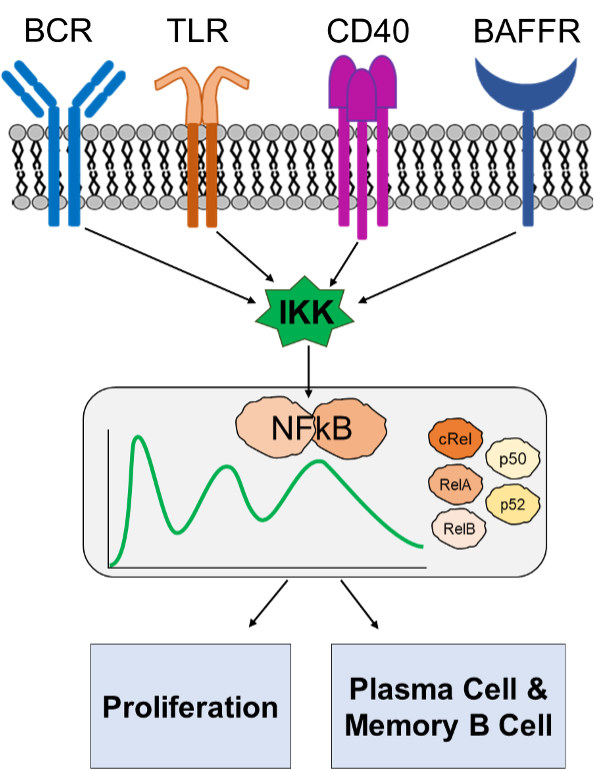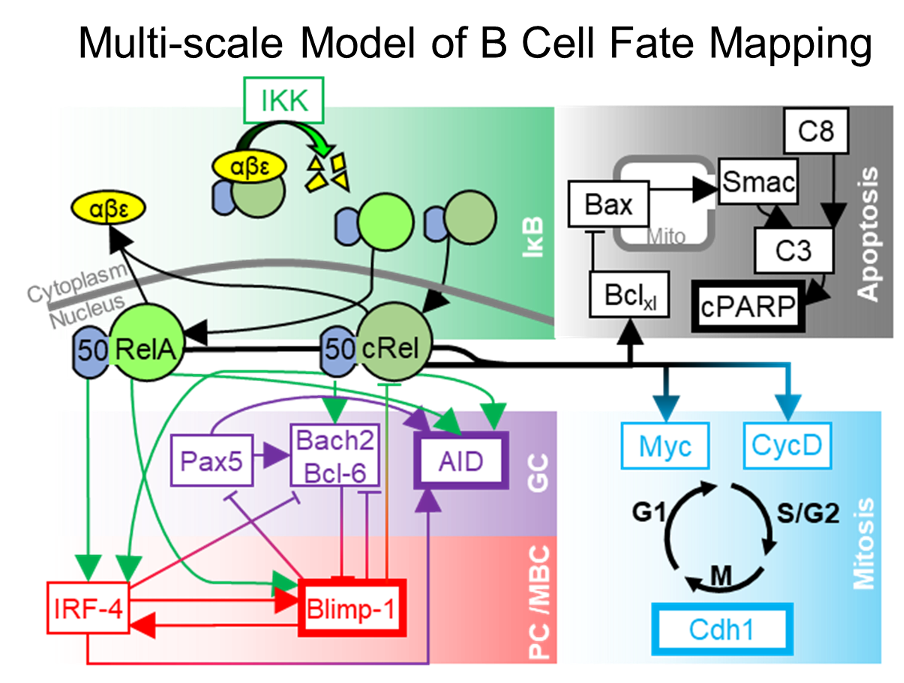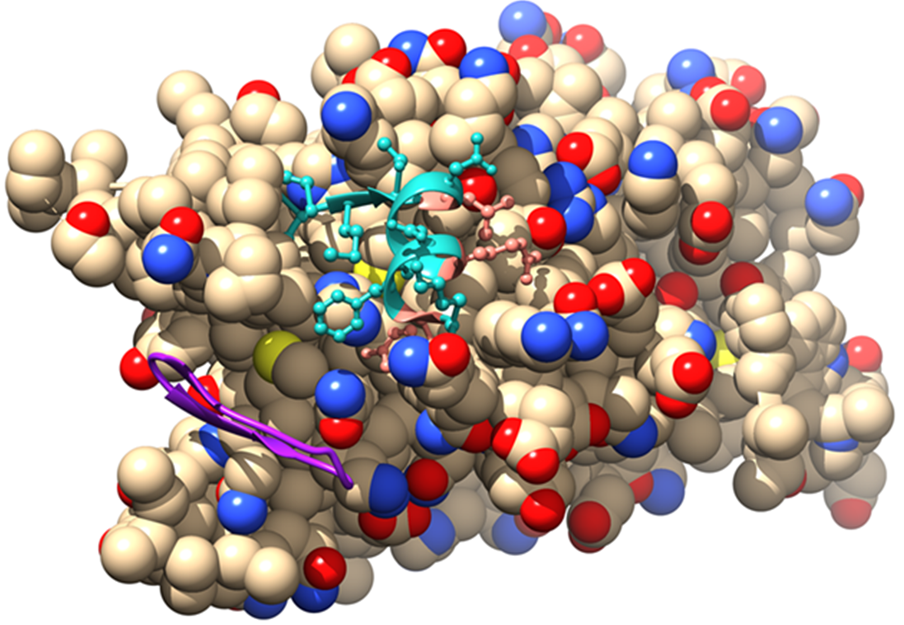Koushik Roy
Assistant Professor of Microbiology & Immunology
Transcriptional Regulation, Viral Immunology, Cancer, Autoimmunity, Protein Design, and Vaccine
Molecular Biology Program
Biological Chemistry Program
Education
M.S. Jadavpur University
Ph.D. CSIR-Indian Institute of Chemical Biology
Postdoc: University of California, Los Angeles
Research
Research Overview
We are interested in understanding B cell fate decision to plasma cell and memory B cell in physiology and how pathogens perturb these fates. The mechanistic knowledge will direct us to design therapeutic strategies for B cell mediated disease (B cell lymphoma) and develop vaccination approaches to combat infectious diseases. We will implement iterative systems biology approaches involving contemporary omics and microscopy workflows to understand divergent B cell responses and cutting-edge chemical biology tools to design structure-function based vaccine antigens.
Major Projects in the Lab:
- NFkB signaling and transcription in regulating plasma cell and memory B cell generation.
- Quantitative understanding of signaling and transcriptional regulation in B cell differentiation using mathematical modeling.
- Structure-function-guided protein/peptide-based therapeutic molecule development to improve vaccine response and treat B cell cancer.

Project 1: NFkB system in B cell fate decision.
The efficacy of vaccination relies on at least two layers of defense. The first line of defense against reinfection is the pre-existing antibodies produced by plasma cells. The second line of defense is the rapid reactivation of memory lymphocytes. Activation of B cell is a critical step for the antibody production. Activated lymphocytes enter a proliferative phase, followed by differentiation to the effector cells and memory cells. We are accustomed to thinking about phenotypes as discrete states in which a single genotype maps to a distinct phenotype. However, single cell studies uncovered that each cell has a unique proteome implying that a single genotype can give rise to a range of phenotypes, with varying degrees of overlap(s). In support of this hypothesis, further experiments revealed a high degree of variability in the phenotypes of genetically identical cells grown and treated under identical conditions. Our study showed that the decision of a genetically identical B lymphocyte to enter the proliferative program is highly variable and NFkB system is a key regulator of B cell fate decision to plasma cell. Ongoing studies are trying to find out the role dynamics of NFkB in antibody homeostasis and memory B cell generation.
Project 2: Quantitative understanding of lymphocytes response in infectious disease.

Many infectious pathogens disseminate infection by exploiting the adaptive immune systems. Activation of lymphocyte B cell is critical step for adaptive immune response. Activated lymphocytes enter a proliferative phase followed by differentiation to the effector cells. The balance of proliferation and differentiation is critical for physiological lymphocyte dynamics whereas pathogenesis dysregulates the balance and leads to either aberrant proliferation or differentiation. Our research focus on quantitative understanding of the dynamics of B cell responses in infectious diseases in order to enable therapeutic development.
Project 3: Structure-function guided development of peptide based immunomodulators

RSC Med Chem, 2021
Peptide based therapeutic agents are advantageous over small molecules and large macromolecules because of its specificity, safety, low cost and easy handling. In laboratory, the synthesis, storage, cost and handling of peptide is much more user friendly than protein. Thus, for the last few decades, chemical biologist are trying to use peptides for multiple purposes, such as, vaccine candidates, a model system to study protein function and as a regulatory domain in artificial transcription factor. On this direction, we have designed a synthetic peptide based artificial transcription which can activate transcription in mammalian cell. On another context we have shown that a synthetic peptide based inhibitor of Fc receptor enhances antibody production in mouse model. Our research focus on developing peptides molecule with wide applications in various as aspects immunology.
-
Rational thinking is essential.
-
Feedback and criticism help to grow.
-
Self-criticism improves self-awareness and personal growth.
-
Diversity increases productivity.
-
Mentorship should be part of the lab goals.
-
Mental health is as important as physical health.
-
Emotion is part of life.
References (Selected Publications)
- Roy K*, Mitchell S*, Liu Y, Ohta S, Lin YS, Metzig M, Nutt S L and Hoffmann A. A regulatory circuit controlling the dynamics of NFkB cRel transitions B cells from proliferation to plasma cell differentiation. Immunity, 2019, 50(3):616-628. (*Equal Contribution) (F1000 Faculty recommended as New Finding and Interesting Hypothesis)
- Mitchell S*, Roy K*, Zangle TA, Hoffmann A. Non-genetic origins of cell-to-cell variability in B-lymphocyte proliferation. Proceedings of the National Academy of Sciences, USA, 2018, Mar 20. 115(12):E2888-E2897. (*Equal contribution)
- Roy K, Roy S and Roy S, A Mimotope Attached to an ITIM-SHP-1 Interaction Inhibitory Peptide Boosts Immune Response and Efficacy. RSC Medicinal Chemistry, 2021, 12(6):994-999.
- Roy K, Mazumder A, Ghosh P, Naiya G, Ghosh B, Roy S. A Peptide-based Synthetic Transcription Factor Selectively Activates Transcription in a Mammalian Cell. Chemical Communications, 2018, 54(13):1611-1614.
- Roy K*, Mandloi S*, Chakrabarti S, Roy S. Cholesterol Corrects Altered Conformation of MHC-II Protein in Leishmania donovani Infected Macrophages: Implication in Therapy. PLOS Neglected Tropical Diseases, 2016 May 23;10(5):e0004710. (*Equal contribution) (F1000 Faculty recommended as New Finding)
- Roy K, Naskar K, Ghosh M, Roy S. Class II MHC/peptide interaction in Leishmania donovani infection: implications in vaccine design. Journal of Immunology, 2014, 192(12):5873-80.
- Roy K, Ghosh M, Pal TK, Chakrabarti S, Roy S. Cholesterol lowering drug may influence cellular immune response by altering MHC II function. Journal of Lipid Research, 2013, 54(11):3106-15. (F1000 Faculty recommended as Interesting Hypothesis)

